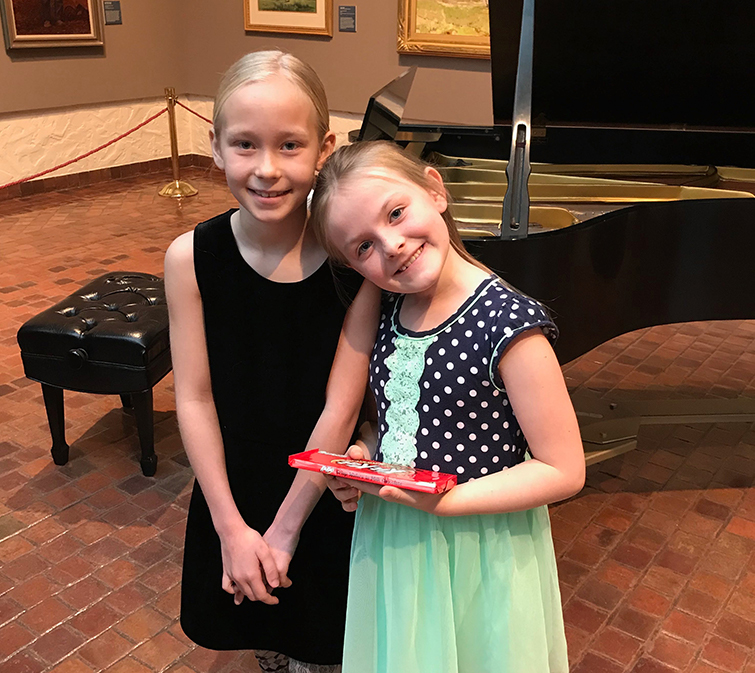Are you nervous about your upcoming recital, talent show, or event? I get it. I get nervous too sometimes.
When I was young, I hated performances because I would get so nervous! In fact, when I switched to a new teacher in high school I told him ‘I’m not going to perform for anyone.’ He just smiled, probably thinking ‘we’ll see about that…’ By the second month in his studio, he had me playing in performance class. And the next year I was playing with the Jazz Band and accompanying the school choir. Boy am I glad he didn’t take me too seriously! The more I have played for people, the easier it has become, and the less nervous I feel.
Today I’d like to share 4 tips to help you have a great performance experience:
Tip #1: Put yourself under the scrutiny of others and perform your pieces a LOT.
Take every chance you can to play your songs for people - especially people other than your family, because, we’re already too comfortable letting our family see our mistakes. Playing for others will put your body into that state of heightened awareness where your brain might go blank, and your fingers go jittery or your leg shakes so much you can’t hold the pedal down!
Why would someone want to willingly put themselves through that situation, you ask? Two reasons: One, because you need to practice playing while your body isn’t in it’s calm and happy place. Second, as you put yourself in that state, you will actually learn how to calm yourself down under that pressure, so eventually those jitters don’t even happen! Doesn’t that sound great?
Tip #2: Test your security with the piece by using games, such as ones found in Philip Johnston’s book The Practice Revolution.
One favorite game of my students is Hangman. In this game, the partner thinks of a word and draws the board. The student then plays their piece or chosen section of the piece one time only. If they play absolutely perfectly with no mistakes, then they get to point to one of the spaces and the partner HAS to tell them what letter goes there, as well as fill in any spaces that letter may occur again. BUT, if the student plays their passage with even ONE mistake, then they guess a letter, and if they guess wrong, the partner draws the ‘head’. Now, in this version of Hangman, the student is only allowed four chances to guess letters wrong (so a head, a body, arms, and legs). They must discover the word by playing correct play-throughs or by guessing correct letters before those chances run out, or the game starts over.
Other favorite games from this book are Tic-Tac-Toe, The Seven Stages of Misery, and Towers of Mozart. These games help to put your body into that ‘jittery’ state as well, so if you don’t have regular audiences, you still get practice with that.
Tip #3: Prepare properly.
If your piece is a fast tempo piece, and you only practice at full speed for the two to four weeks leading up to the big performance, then I’ll tell you what’s going to happen to that song: it will fall apart in front of your eyes like a dried-out crumbly slice of cake. Your perfectly even 16th notes will become sloppy and uneven. Parts of the song that were the easiest will start to become troublesome. I don’t really know why this happens, but my idea is that it has to do with reinforcing the body’s nerves and muscle memory over time.
Proper practice for fast pieces ALWAYS includes slow and medium tempo practice. In addition to reinforcing the nerves and muscles, these slower tempos expose your weak areas - it’s very hard to play correctly at slow and medium tempos sometimes. So then you will know which areas need a little more TLC.
Tip #4: Breathe. Innnnn…...Ouuuuuuttttt……. That’s it. Just breathe.
Okay let me explain. Sometimes when we get into an uncomfortable situation, such as being in the spotlight while 75 pairs of eyes are on us, we hold our breath. This does nothing to help our bodies get out of that ‘jittery’ state mentioned earlier, and makes us feel even more uncomfortable. So, while you practice your song, I recommend you also practice breathing. Decide which points in the song you will take in a deep breath, and which points you will let out a deep breath. (Just don’t do it so loudly that we can’t hear the music, okay?)
One time I even wrote into my music the words ‘breathe’ in certain measures so I wouldn’t forget as I practiced. And actually, when I performed that piece of music, it was one of my best performances ever. The breathing made me feel so calm and alive and present! I was able to really listen to myself and respond in each moment, bringing emotion into the piece without getting flustered by nerves. It was an unforgettable experience.
I hope you enjoyed today’s 4 tips for a successful performance!
Let’s end with some words of wisdom from Josh Waitzkin’s book The Art of Learning:
“We need to put ourselves out there, give it our all, and reap the lesson, win or lose. The fact of the matter is, there will be nothing learned from any challenge in which we don’t try our hardest.”
Remember that as pianists, performance is our opportunity to give it our all, and is a process unto itself. So just go out there, give it your best effort, and be open to learning the lessons that come through that experience!

